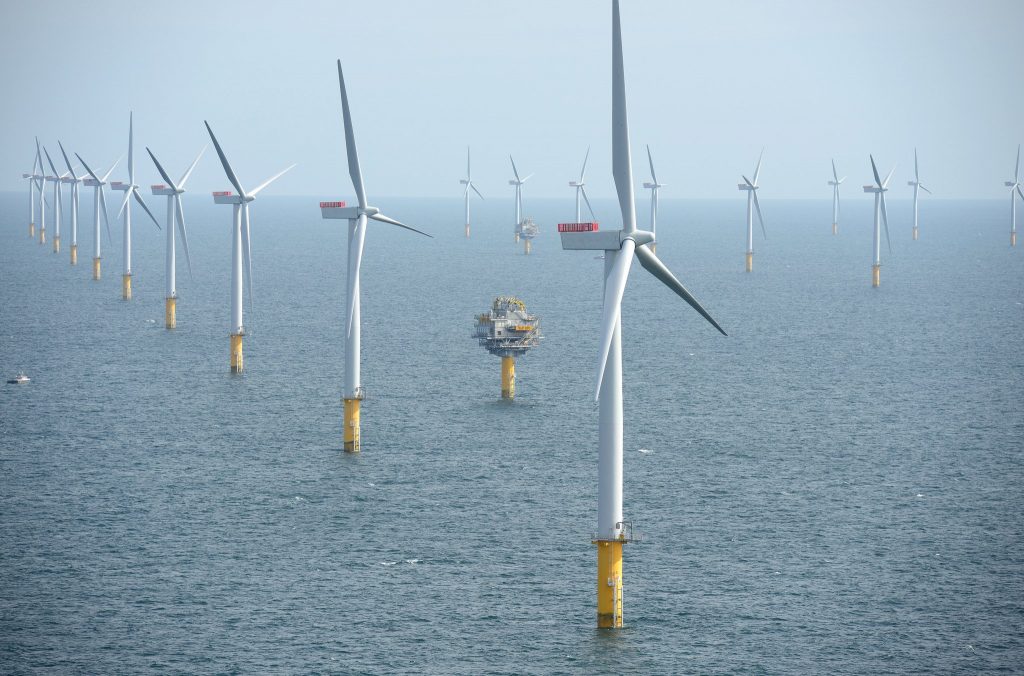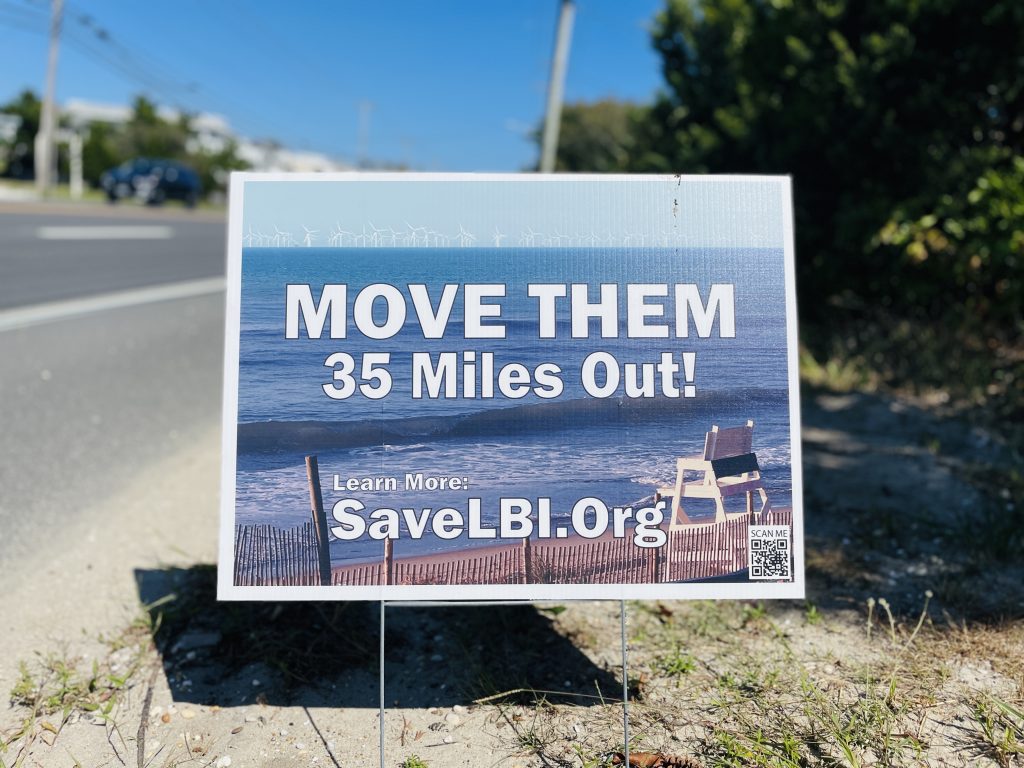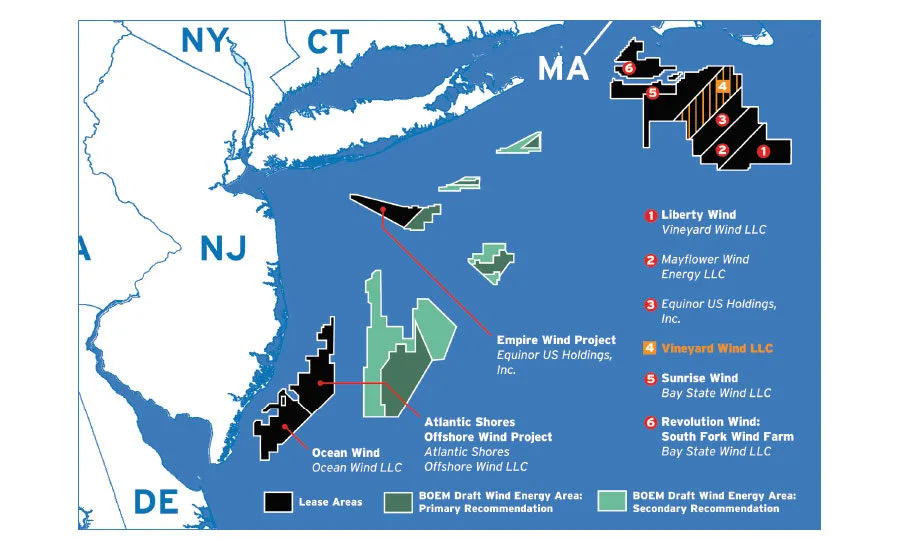A report authored by the federal Bureau of Ocean Energy Management last spring raised concerns that wind turbines off the New Jersey coast could interfere with radar systems associated with the North American Aerospace Defense Command, including those at Joint Base McGuire-Dix-Lakehurst.
The report came to light after U.S. Rep. Chris Smith this week slammed the federal agency for issuing a new memorandum of understanding between BOEM and the U.S. Department of Defense to collaborate on offshore wind development, saying the agreement “heightens serious concerns over whether projects that have already been approved were thoroughly and properly vetted by the U.S. military for adverse impacts on national security and military readiness.”
The Biden administration has already approved 10 offshore wind projects without having addressed the concerns highlighted in the report, leading Smith to question BOEM Director Liz Klein at a congressional hearing on whether offshore wind projects would make military vessel navigation less safe. Their exchange occurred just one week after Bloomberg reported that the Pentagon had deemed several areas off the East Coast as “highly problematic” for offshore wind development due to proximity to military operations.
Locally, the 560-page BOEM report issued in May raised concerns not only over vessel navigation, but radar arrays linked to NORAD, which is responsible for monitoring and securing the airspace of the United States and Canada. A review conducted as part of the BOEM report found potential issues with the Atlantic Shores offshore wind project, given its proximity to the Joint Base.
“The review identified anticipated adverse project impacts on North American Aerospace Defense Command (NORAD) radars and Department of the Navy missions,” the reported stated, specifically giving mention to the Gibbsboro New Jersey Air Route Surveillance Radar (ARSR-4) and the Wrightstown-McGuire AFB New Jersey Airport Surveillance Radar (ASR-11), both of which are used for NORAD air defense missions.
“Potential impacts on military and national security operations from the permanent placement of structures within the water column and above the sea surface within the wind turbine area (WTA) are expected to be long term and localized,” the report stated, adding that the structures could also complicate search-and-rescue operations carried out by the U.S. Coast Guard.
“BOEM’s own analysis for the Atlantic Shores South project acknowledges that the offshore wind turbines would specifically interfere with federal and military radar systems, even mentioning Joint Base McGuire-Dix-Lakehurst by name,” said Smith. “And yet shockingly, BOEM has already issued full federal approval for construction to move forward — even before reaching this new agreement to work with the Defense Department.”
According to BOEM, the memorandum of understanding includes calls for BOEM and DOD to:
- “Collaborate as early as possible in the offshore wind leasing process,”
- “Regularly communicate and exchange information at the staff and leadership levels,” and
- “Determine what areas should be deferred from leasing to enable the performance of DOD activities.”
Smith has questioned how these partnerships and deconfliction efforts would be handled in the cases of the 10 projects that were approved before the memorandum was reached.
“Anyone who has been paying close attention to the shoddy and reckless approval process for these offshore wind projects will not be fooled by this after-the-fact proposal — which is far too little and far too late,” said Smith.
The memorandum was signed at a ceremony in Atlantic City which included Klein and DoD officials.
“DOD is committed to working across the U.S. government to accelerate the ongoing clean energy transition, which is critical to ensuring access to reliable and resilient energy sources in order to fulfill our mission,” Assistant Secretary of Defense for Energy, Installations, and Environment Brendan Owens said in a prepared statement. “We will continue to work with BOEM and our other interagency partners, to find solutions that enable offshore wind development while ensuring long-term compatibility with testing, training, and operations critical to our military readiness.”
The joint statement issued by BOEM and DoD did not address whether the agreement could have an effect on offshore wind facilities that have already been approved by the federal government.
Offshore wind projects have been heavily favored by Gov. Phil Murphy and his allies within the Biden administration, despite considerable pushback over concerns of “industrializing” the Atlantic Ocean, obstructing scenic views, and the turbine’s impacts on marine mammals as well as species targeted by commercial fishermen.
The administration has favored deploying 30 gigawatts of offshore wind energy capacity by 2030 and 15 gigawatts of floating offshore wind energy capacity by 2035.
Last year, Smith introduced legislation, which was passed by the GOP-led House of Representatives in July 2023, that would require presidential certification that offshore wind projects would not “weaken, degrade, interfere with, or nullify the capability of radar relied upon by the Federal Aviation Administration or the Armed Forces.”
The bill did not pass the Senate, nominally controlled by Democrats considering Vice President Kamala Harris’ tie-breaking duty.
Though he has not taken a definitive stand on specific projects, proponents of offshore wind have opined that former President Donald Trump could take steps to stymie, or otherwise cancel, the projects should he regain office following next week’s general election. Trump spoke negatively about offshore wind turbines during a rally in Wildwood earlier this year, saying they “destroy everything” and produce energy that is unaffordable. His opponent, Harris, has signaled support for continuing offshore wind development, saying the projects are a key facet of solving the “climate crisis.”


Police, Fire & Courts
South Toms River Man Charged in Violent Murder of Wife

Police, Fire & Courts
Toms River Man Sentenced to Prison for Assault, Eluding, Robbery, Threats









